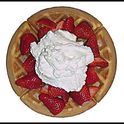My slow cooker brisket is falling apart but meat is dry -- where did I go wrong?
Hosting my first family Passover in a few weeks so decided to try a slow-cooker braised brisket recipe from America's Test Kitchen. It came out falling apart (mostly, there were some tougher parts near the edges) but the meat itself was dry before we drowned it in the jus created in the cooking process. Did I overcook it or not cook it enough? Any other slow-cooker brisket tips?
13 Comments
And you discovered the technique that many cooks take advantage of routinely; a braise is often better the second day.
I'm glad it all worked out.
http://www.americastestkitchen.com/recipes/detail.php?docid=6398
The conversion process begins around 140F and is most efficient close to boiling. Simmering is ideal but since the interior temperature of the braising vessel can't really rise above the boiling point, there's a built-in temperature regulator.
As the meat heats up, it toughens and loses all its moisture into the braising liquid. After a time, it will relax, reabsorbing a small amount of what it lost (which by now will be highly flavored by whatever liquid we started with).
By any other measure what we end up with is overcooked and dried out but we perceive (properly) braised meat to be juicy because of the sauce -- dissolved gelatin and melted fat. Yum!
If you start with too much liquid or if the meat and / or vegetables give up too much of their own, the sauce will be weak. Simply reduce before serving and start with a more concentrated liquid next time.
If the meat is truly falling apart, it was cooked too long. It can be saved, corrected actually, by allowing it to cool, slicing it, then reheating. As the meat cools, the gelatin firms up. The amazing thing is that it won't melt again by the time the roast comes back up to serving temperature.
Tonight I attempted my first oven cooked ( or other) Brisket.
Having never purchased Brisket I followed the butchers instructions to a T- very low oven (110) 5 hours for a 1.8 kg thin cut.
Seasoned only with salt pepper and garlic and a nice BBQ sauce rubbed in on the fourth hour.
It was stringy, moist only in the middle and had no more taste than a basic baked topside
Was very disappointed in myself!
However understanding what happens to the meat during this process is very helpful. Thank you
1. Prick 5 lb brisket all over with fork and add dry rub (paprika, onion powder, garlic powder, kosher salt, pinch cayenne). Wrap tightly with plastic wrap and leave in fridge for 8-24 hours. (Mine sat with dry rub for approx. 15 hours). Transfer brisket to large slow cooker (mine is 6 qts and the 5 lb brisket still barely fit).
2. Slice 3 onions 0.5" thick. Saute in 1T vegetable oil with 1T tomato paste, 3 minced garlic cloves, (and maybe something else, can't remember off the top of my head) for 8-10 minutes until onions are softened and lightly browned. Add 3T flour and cook 1 minute. Slowly whisk in 1c chicken broth, incorporating flour and scraping up any browned bits. Transfer to slow cooker.
3. Stir in 2T red wine vinegar, 3 thyme sprigs & 3 bay leaves. (The "stirring" in this step was difficult, as it was mostly onions on top of a brisket.) Cook on low 9-11 hours or high 5-7 hours. (Mine cooked on low 9 hours and 40 minutes. I have an All-Clad 6 qt slow cooker.)
4. Remove brisket and let stand loosely tented with foil for 20 minutes before slicing against the grain. Let jus stand 5 minutes then skim off fat with large spoon. Add 1t additional vinegar and salt & pepper to taste. Arrange sliced brisket on platter, top with 1c of jus and serve rest on the side.
I'll try to explain more below where there's a bit more room.




